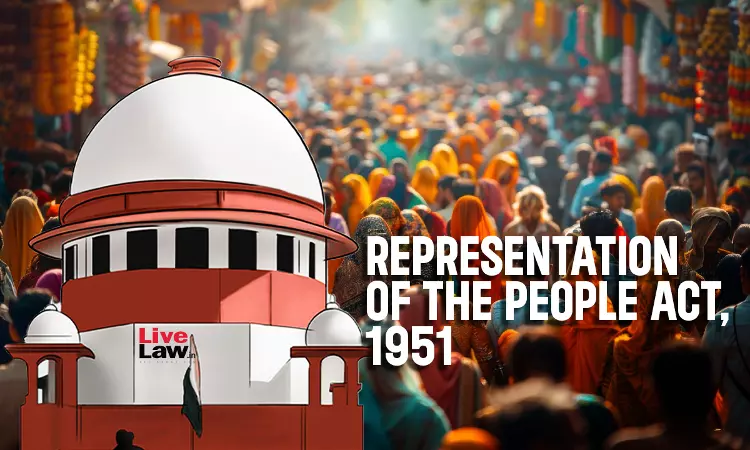- Home
- /
- Top Stories
- /
- RP Act | Supreme Court Refuses To...
RP Act | Supreme Court Refuses To Interfere With HC View That S.81 Limitation Can't Be Satisfied By Presenting Defective Election Petition
Debby Jain
2 May 2025 4:23 PM IST
In an election dispute, the Supreme Court today upheld a view taken by the Gujarat High Court that mere "presentation" of a defective election petition, without removal of defects within the limitation period of 45 days, is not satisfactory compliance of Section 81 of the Representation of the People Act, 1951.A bench of Justices Surya Kant and N Kotiswar Singh passed the order in a...
In an election dispute, the Supreme Court today upheld a view taken by the Gujarat High Court that mere "presentation" of a defective election petition, without removal of defects within the limitation period of 45 days, is not satisfactory compliance of Section 81 of the Representation of the People Act, 1951.
A bench of Justices Surya Kant and N Kotiswar Singh passed the order in a matter pertaining to 2022 Gujarat Assembly elections.
During the hearing, Senior Advocate Rachna Srivastava (for petitioner) contended that the subject provision contemplates "presentation" of an election petition within 45 days, not "registration", and reading it to mean "registration" would be judicial amendment of the provision. Citing High Court Rules, she further submitted that if objections are not removed within stipulated time, the matter has to be placed before a judge (who may decide to grant or not grant time to remove objections), but this was not done. On facts of the case, the senior counsel also alleged that the returned candidate has criminal antecedents (including 19 FIRs), which were concealed by him.
Justice Kant responded to the submissions, saying, "20 candidates were available. Out of those 20, people voted for him in such a manner that he won by 15000 margin - in an Assembly election...(on alleged criminal antecedents) somebody should have come on time".
The judge further remarked, "if your [petitioners'] argument is accepted that a petition with any kind of defect, you just present before the limitation date, where it will be treated as presentation...it will be a very, very dangerous proposition."
To another counsel appearing in the connected matter, Justice Kant said that the law permitted the petitioners to remove objections within stipulated time, but they did not do so. "Why should we entertain this kind of litigation? You simply want to harass an elected candidate!", the judge exclaimed.
As per facts noted in the High Court order, the election petition in the present case was presented much after the expiry of limitation period of 45 days. The result was declared on 08.12.2022 and the election petition filed on 18.01.2023. After scrutiny, necessary information was provided to the clerk of petitioners' counsel on 19.01.2023. Even so, objections were removed and the petition registered only on 17.02.2023. Forty-five days from the date of declaration of the result got over on 23.01.2023.
In response to the election petitions, the respondent/returned candidate made an application under Order 7 Rule 11 CPC (for rejection of the election petitions) seeking their rejection, claiming that they were barred by limitation.
The question before the High Court was whether the election petitions preferred by the petitioners were "presented" within limitation and if so, whether the non-removal of objections pointed out by the Registry within the prescribed period was fatal. This involved interpretation of the term "presentation" in Section 81 of RP Act, that is, whether mere presentation of an election petition, containing defects, was sufficient compliance of Section 81?
After perusing the facts of the case and judicial precedents, the High Court held that presentation of a defective petition, and non-removal of objections within the limitation period of 45 days, would entail consequences like rejection thereof on account of being barred by limitation. Rejecting the election petitions, it said,
"there is no provision which confers any power upon the Registrar or any officer authorized by him to permit the correction or removal of the objection in an election petition beyond the period of 45 days...the election petition is barred by the limitation and is liable to be rejected under Order VII Rule 11 (d) of the Code."
Challenging the High Court order, the petitioners approached the Supreme Court.
Appearance: Senior Advocate Rachna Srivastava and AoR Bharti Tyagi (for petitioner)
Case Title: PANKAJKUMAR BACHUBHAI VELANI (JAIN) Versus KIRITKUMAR CHIMANLAL PATEL AND ORS., SLP(C) No. 11279-11280/2025 (and connected case)



